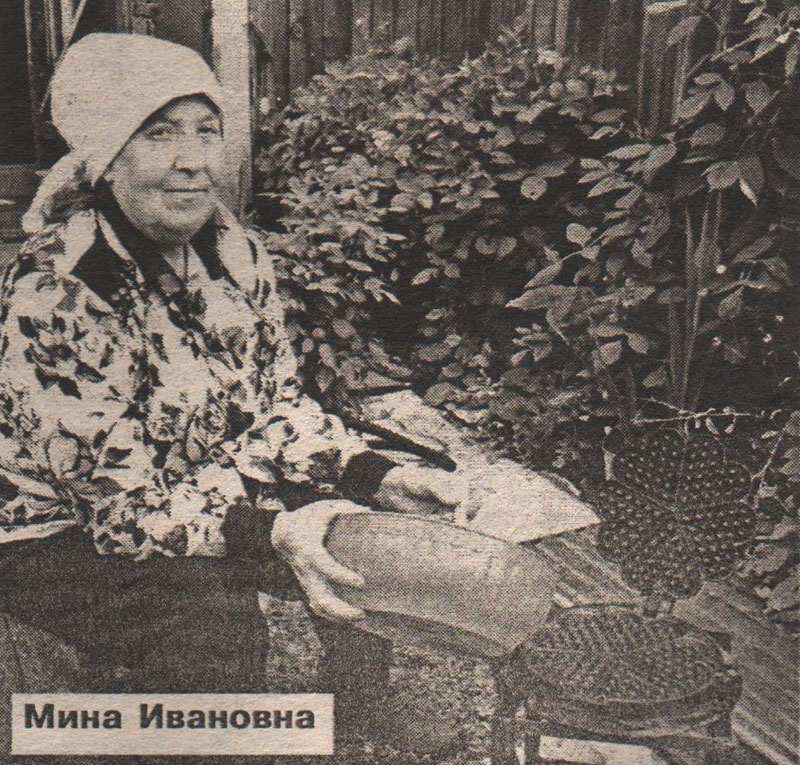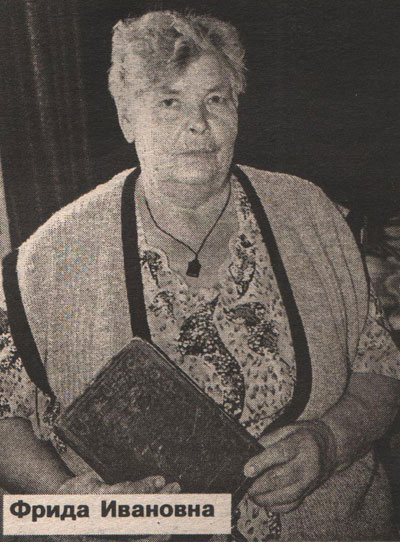









Probably in every house the occupants are keeping objects which were acquired by their ancestors and are carefully passed from one generation to the next. These are quite often yellowed photographies, lockets or historic documents. Occasionally can be found relics such as objects or pieces of furniture like a chair or commode fabricated by the grandfather or great-grandfather, a napkin embroidered by the grandmother or a wedding icon. All these objects are in close connection with important events and relate to a definite historical epoch. Family relics are of great value. Like no other item in the house they bear some special meaning and sometimes even serve as guardians and talismans for success and well-being of the family members.

When the deportation of the Volga-Germans began, nobody could imagine where they would take them and for how long it would be. In this extremely confusing situation the people took along whatever they were able to carry. Some packed objects od daily use and garments, other preferred to keep documents and commemorative photographs with them.
The Simon family, who was deported from the village of Straßburg, Pallassovka District, Stalingrad Region, took a waffle iron and the Bible with them to Suhobuzimskoe. At present just three of the Simon’s children are still alive. The sisters Frieda, Mina and Elsa all live in Suhobuzimskoe. They are carefully preserving the family relics their parents passed on to them.
In the late autumn of 1941 the deportees, the Simon family among them, were taken to Atamanovo by ship. David, the youngest son, was less than one year old at that time. On the same day the exiles were transported further to Shoshkino.
 - The people came in flocks to look at the arriving Germans, - Frieda
Ivanovna recalls. - They said something in Russian, but we did not know the
language at all and just shyly reduced glances. The majority of locals proved
friendly. You could feel that they felt sympathy for us and were willing to help.
Our neighbor, Aunt Dusja, a woman without own children, often invited me to stay
with her; she would then pour tea and entertain me to some delicate food.
- The people came in flocks to look at the arriving Germans, - Frieda
Ivanovna recalls. - They said something in Russian, but we did not know the
language at all and just shyly reduced glances. The majority of locals proved
friendly. You could feel that they felt sympathy for us and were willing to help.
Our neighbor, Aunt Dusja, a woman without own children, often invited me to stay
with her; she would then pour tea and entertain me to some delicate food.
Mina Ivanovna was just six years old, when in her family removed to Sukhobuzimskoe in the winter of 1942.
- It dawned on already, but we were still driving with our hay cart on the snowy road. It seemed, as if the huge snowdrifts would never end. It was so horrible, when the howling of wolves penetrated the winter silence. Covered by long, non-padded fur coats, cuddled together, we were dreaming of reaching our final destination more quickly.
The first years in exile were the most difficult. The family had to experience lots of humiliations, hurts and fears. The father and the elder brother were mobilized to the labor army. The mother stayed at home alone with her five children. They dwelled in a tiny hut on the banks of the Malyi Buzim river. Today this place is called the Street of the four Fighters. Furniture and home inventory consisted of an small oven, planks that served as bedding and a chest, which was used as table. After Yekaterina Alexandrovna had arrived in Siberia, she began to seriously getting homesick. She almost entirely stopped talking, often quietly lay on the plank with her face turned to the wall, while she was crying and sobbing, saying that she wanted to return to the Volga.
- Mum was always sad, even apathetic, - Frieda Ivanovna recalls. - But I understood about her grief and heartache only, when I grew up. One day we left for the woods to gather firewood. We chipped the woods by axe, tied the fascines on our backs and started back for home. It was January, it was freezing cold, and we had to hurry up to be back before nightfall. I went ahead. All of a sudden Mum began to sing… It was so unexpectedly. She was singing a well-known religious song in German. I turned round in order to ask her, where she got the strength to sing – and noticed the tears all frozen on her cheeks.
It is a miracle the sisters said unanimously that all children stayed alive during the war. They are convinced that this was due to grandmother’s Bible, which was published in 1900. In the course of time it’s cover yellowed seriously, so that you can hardly decipher the German headline “God is with us”. Mother went to the people, hired herself out with all kinds of unskilled work, in order to receive a pot of milk or a piece of bread. When there was no work available, they were forced to go begging. The youngest, Andrei and David, who were three and four years old at that time, went begging for alms. Perhaps this is the reason for why the local children used to assail the Simon children with offending words.
- In the place, where the Pension Agency and the Social Welfare Office are situated today, there was a canteen, - Mina Ivanovna tells us, - people in military uniform went there for lunch. We kept waiting, until they finally left, and then ran over towards the tables to lick up what they had left on their plates. It seemed to us as if there was nothing more tasty than groats.
It sometimes happened that we stole. Not far from the place where we lived, there was the supply office. People approach with horses, enter the building to deliver skins, while we run over to the stirrups, unfix the bags containing a bottle of milk or a loaf of bread and then quickly make off. Today we recall this with a laughter, - said the old woman, - but at that time we felt so terribly hungry. This sense of hunger was much stronger than any other feeling.
- We used to bake flat cakes from frozen potatoes in rancid fat, - Mina Ivanovna continues to share her memoirs with us. – Mother portioned them, but everyone would have like to eat more. Before going to bed, Mum would read the Bible, which we had brought along, and our hungry feeling became slightly relieved.
When the family was finally able to acquire a cow, life got a little easier. The kept the animal behind a hurdling within the vestibule. At that time the waffle iron, which Mum had taken along from the Volga, also stood them in good stead. The crispy waffles reminded them of home, of their former life.
In the summer we went into the woods several times a day to berry. In those years the entire neighborhood od Sukhobuzimskoe was simply strewn with woodland strawberries. We sold a pailful at three rubles on the market. We gave the money to our mother; she economized it to later buying hay.
At the end of the war Mina and Elsa, the twins, went to school. The girls did not have any garments, but they got a dress made of calico at school. Their school education ended three years later. The teacher, Anna Sergeevna Ivanova several times tried to convince the father that the girls should continue to go to school, but Ivan Yakovlevich remained stubborn: „And who is going to do all the work?“
Many years have passed since then. The sisters grew up, started their own families. They consider Siberia to be their home. Elsa worked as a technician for the sovkhoz club, Frieda as a cook for the canteen. Mina Ivanovna had a job as a swineherd, milkmaid and took care of the poultry. For another period of forty years she worked as a plasterer and house painter in the construction brigade. As a veteran of production she is in possession of numerous documents of honor; her photograph was hanging on the board of honor in the sovkhoz building for many years. The objects which her family took along during deportation Yekaterina Aleksandrovna handed over to her daughters.
The old cast-iron waffle iron is still in good condition. It is amazing, but it is still working and has never been out of order during 70 years.
- Take it in your hands, - says the old woman smiling, but through a mist of tears, - and you will get back straight to the past. I recall my childhood, my Mum, and it warms my heart. Many times I was proposed to sell these valuable memorabilia of our family, but can we sell our memory?
Tatyana Badenkova, picture Aleksei Matonin
„Country Life“ (hamlet of Sukhobuzimskoe), 28.08.2009